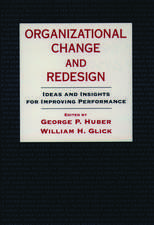The Necessary Nature of Future Firms: Attributes of Survivors in a Changing World
Autor George P. Huberen Limba Engleză Paperback – 18 feb 2004
Preț: 722.26 lei
Preț vechi: 880.80 lei
-18% Nou
Puncte Express: 1083
Preț estimativ în valută:
138.22€ • 143.77$ • 114.11£
138.22€ • 143.77$ • 114.11£
Carte tipărită la comandă
Livrare economică 14-28 aprilie
Preluare comenzi: 021 569.72.76
Specificații
ISBN-13: 9780761930365
ISBN-10: 0761930361
Pagini: 328
Dimensiuni: 152 x 229 x 17 mm
Greutate: 0.45 kg
Ediția:New.
Editura: SAGE Publications
Colecția Sage Publications, Inc
Locul publicării:Thousand Oaks, United States
ISBN-10: 0761930361
Pagini: 328
Dimensiuni: 152 x 229 x 17 mm
Greutate: 0.45 kg
Ediția:New.
Editura: SAGE Publications
Colecția Sage Publications, Inc
Locul publicării:Thousand Oaks, United States
Recenzii
"While many books deal withdecision making and many more deal with environmental complexity, this is oneof the first to lucidly tie them together and provide executives with thespecific tools and mind-set necessary to bring about significant organizationalchange. The University of Wisconsin-Madison is a key driver of the integrationof business and science, and this book will be a must-read for many of the studentsin our masters and executive education programs."
"Thebook offers yet another outstanding contribution by an author known forscholarship and insightful observations about the state of organizations andtheir management. The topic is timely and the book offers many useful ideasthat will find their way into practice. I highly recommend it."
"Thisbook is a must read for managers concerned with guiding their organizationsinto the information age. Management futurologists and academic writers havespeculated on the features and characteristics of new organizational forms. The Necessary Nature of Future Firms byGeorge Huber represents the first rigorous in-depth effort at anticipating theshape of new organizations by combining, recombining, and interpreting a vastmanagement research literature and presenting it to managerial audiences. Thebook is very accessible to a broad managerial audience but especially toforward looking thoughtful managers concerned with the future of theirorganizations."
“In TheNecessary Nature of Future Firms, George Huber does what Huber doesbest--paint a compelling vision of the design of (near) future organizations aswell as the implications of this design. What differentiates Huber’s‘visioning’ efforts from most others is that they are derived not fromspeculation but rather from the collective thinking of a generation oforganizational scientists as interpreted through Huber’s own research andconsulting experiences. This vision of how future firms will be designed(and, hence, how they will behave) emerges in fact from well-foundedconceptualizations and validated observations.”
“George Huber has written awonderfully comprehensive and integrative book on organizational change,learning, and adaptation. Huber synthesizes the research-based work on changein a way that will be helpful to scholars, graduate students, as well asmanagers interested in organizational learning and change. The book is wellwritten and provocative. It is a state of the art literature review with anexperienced, practical point of view. This book belongs on both the scholar'sdesk as well as in the practitioner's office.”
"ProfessorHuber has produced a valuable and very well researched guide for firms makingthe necessary transition to the knowledge economy. His sage advice andexperiences will greatly help any organization navigate these tricky anddangerous waters."
"GeorgeHuber has achieved an amazing feat in this book. He has eloquently describedwhat it will take for companies to prosper in the future by drawing upon whatwe know today--what we really know, based on rigorous research--about speedflexibility, learning, and innovation. Anyone interested in preparing firms fortomorrow will benefit from this important book."
"Provocative, insightful, and an extraordinary useful look atmanaging complex organizations in rapidly changing environments. This book must be read by managersand scholars trying to comprehend the challenge of managing in uncertain timesunder compressed time constraints."
“In this rich and comprehensive book, George Huber calls onmanagers to take stock of their companies through a careful and systematicanalysis of environmental and other pressures that will shape the nature ofbusiness into the future. The depth of analysis and detailed advice formanagers is impressive. The book provides leading-edge perspectives onknowledge management, change, culture, strategy, and many aspects of decisionmaking and human resource management. This is a timely and comprehensive book thatincludes everything the informed manager needs to know to examine his or herbusiness and move it successfully into the future. This is a must read for theserious, thoughtful executive.”
“The Necessary Nature of Future Firms iscleverly written, grounded in history, integrates an unusually extensive surveyof organizational research, and is filled with evocative examples and practicalguidelines which should make it great reading for practitioner and theoristalike. Huber has accomplished a rare feat--he has created a book that is bothpractically relevant for executives and suggests many viable avenues fororganizational scholarship.”
“After alifetime of important insights in the areas of organizational design anddecision making, Huber has produced his magnum opus. His insights and ideas canhelp even the most seasoned manager see the world differently and become moreeffective.”
"Thisis an important book for any manager who faces a rapidly changing andincreasingly competitive environment--which is to say, virtually every manager.Huber makes a cogent case for the fact that businesses will face much moredynamic and competitive environments in the future than they face today. Moreimportantly, he offers practical advice for how managers can prepare for theuncertain future they face. Clearly written and carefully grounded in the bestresearch evidence available, this book stands head and shoulders above the manymanagement books offering short-term fads, fashions, and therapies of themoment."
“Hubergives a compelling account of the future landscape that many managers have toface today. Filled with solid academic research laced with real-world examples,Huber not only conveys the shape of that landscape, but also the roadmap tonavigate it.”
"GeorgeHuber makes an important contribution with profound insights on what the futurefirm will look like. It will be congruent with its environment. To realizeopportunities from continuing advances in science and technology andenvironmental complexity, the successful firm in the future will be especiallygood at gaining environmental intelligence, learning and integrating knowledge,and being innovative and flexible. Thisis not a fanciful prophesy; it is a necessary logical conclusion that Huberdraws from an extensive body of scientific knowledge."
"Huber's TheNecessary Nature of Future Firms is a remarkable tour de force ofstate-of-the-art knowledge about organizational structures, processes andperformance. The book integrates what we know about fundamental phenomenon inorganizations such as decision making, learning, and innovation. What isexceptional about the book is Huber's ability to integrate research findings todevelop thoughtful guidelines for managers about how to design their firms tobe effective, both now and in the future."
"The book is written in an easy style and has no management jargon. It also provides flow charts and appendices wherever necessary to facilitate understanding. The notes at the end of each chapter and selected references at the end of the book provide an inquisitive reader a rich source to dig deeper. The book also provides interim and final summaries of each chapter, which greatly enhances recapitulation. the book is mainly meant for managers and graduate management students."
Cuprins
Chapter 1 Dangerous Deficiencies
WHAT IS HAPPENING? WHAT IS NOT?
THE ROLE OF TOP MANAGEMENT
ABOUT THIS BOOK
Chapter 2 The Future Environments of Business Organizations
SCIENTIFIC KNOWLEDGE AND IMPROVED TECHNOLOGY
Scientific Knowledge
Improved Technologies
Mental Blocks to Imagining a Different World on the Same Planet
Interim Summary and Transition
THE COMPLEXITY OF FUTURE ENVIRONMENTS
Environmental Variety
Environmental Density and Interdependence
Interim Summary and Transition
ENVIRONMENTAL DYNAMISM AND COMPETITIVENESS
Velocity, Turbulence, and Instability
Environmental Competitiveness
Chapter 3 Sensing and Interpreting the Environment
FACIT AB
IMPORTANCE OF ENVIRONMENTAL SENSING AND INTERPRETATION
Consequences and Importance of Interpretation
ENVIRONMENTAL SENSING IN FUTURE FIRMS
Intelligence Gathering
Intelligence Gathering As a Staff Function? As an Outsourced Function?
Intelligence Gathering As Specialized Accountability
Intelligence Gathering As Eclectic Responsibility
Supporting Sensors
Probing the Environment
Sensing Early Responses to the Firm's Actions and Products
Top Managers As Environmental Sensors
INTERPRETING WHAT IS SENSED
Declines in Quality and Timeliness of Organizational Interpretations
Enhancing Interpretation in Future Firms
Faulty Interpretations
Chapter 4 Organizational Decision Making
DECISIONS AND DECISION MAKING RESOURCE IN FUTURE FIRMS
Increasing Environmental Dynamism and Its Consequences
Increasing Environmental Complexity and Its Consequences
Increasing Competitiveness and Its Consequences
Decision Maker Capabilities: Past, Present, Future
DECISION MAKING PRACTICES IN FUTURE FIRMS
Ensuring Scope
Ensuring Speed
Effects of Forthcoming Information Technologies on Decision Speed and Scope
IT Investments Focused on Analysis
IT Investments Focused on Communication
TEMPTING PRACTICES
Intuitive Decision Making
Satisfying and Analogizing
Firms' Responses to Personal Propensities to Use Short-cut Methods
Chapter 5 Knowledge Acquisition: Organizational Learning
LEARNING, KNOWLEDGE, AND INNOVATION
ORGANIZATIONAL LEARNING: A PRACTICE WHOSE TIME HAS COME
LEARNING FROM EXPERIENCE
Highly Effective Learning Experiences: Designed Experiments
Highly Effective Learning Experiences: Natural Experiments
Highly Effective Learning Experiences: Learning from Action Probes and Operations
Highly Effective Learning Experiences: Learning by Observing Samples of One or Fewer
LEARNING FROM OTHERS - VICARIOUS LEARNING
Absorptive Capacity
Importing Knowledge in the Form of Expertise
Enhancing Organizational Learning by Enhancing Individual Learning
INTRODUCING LEARNING PRACTICES
Chapter 6 Leveraging Learning through Knowledge Management
SEMATECH
THE FOUR REPOSITORIES OF ORGANIZATIONAL KNOWLEDGE
THE NEED TO MANAGE KNOWLEDGE
DIRECT, INFORMAL KNOWLEDGE SHARING
An Example of How Motivation Can Negatively Affect Direct, Informal Knowledge Sharing
Organizational Culture: An Achievable Solution to the Problem of Motivation?
KNOWLEDGE MANAGEMENT SYSTEMS
Motivational Issues in Knowledge Management Systems
Managing Motivation in Knowledge Management Systems
Situational Influences Favoring the Use of Extrinsic Motivators
Long-lived traditions and cultures
Increased use of teams, and of incentives for team performance
Lower levels of organizational and group identification
Person-to-Person Knowledge Sharing from a Distance
PLANNED KNOWLEDGE TRANSFER ACROSS TEAMS
Capturing and Transferring Team Learning
Obstacles to Intra-Organizational Knowledge Transfer, and Solutions
Chapter 7 Innovation: The Integration and Exploitation of Knowledge
OCCUPATIONAL SPECIALIZATION
WITHIN-FIRM APPROACHES TO INTEGRATING KNOWLEDGE: A BRIEF RECOUNTING OF CURRENT STRUCTURES AND PROCESSES
Interim Summary and Transition
KNOWLEDGE INTEGRATION STRUCTURES IN FUTURE FIRMS
CHANGES IN INTRA-FIRM STRUCTURES AND PROCESSES
Dividing and Coordinating the Work
Coordination Processes
INTER-FIRM STRUCTURES
Knowledge Transfer Between Levels and Across Firms: A Brief Update on Current Practice
CHANGES IN EMPLOYMENT PRACTICES
Changes in Staffing Practices
Finding Expertise
CHANGES IN EXPERTS' EMPLOYMENT STRATEGIES
Factors Curtailing the Growth in Independent Contracting
Chapter 8 Dealing with the Simultaneous Needs for Change, Productivity, Flexibility and Employee Commitment
MORE-THAN-OCCASIONAL CONFLICTS
Change-Productivity Conflict
Change-Commitment Conflict
Change-Flexibility Conflict
Productivity-Commitment Conflict
Flexibility-Productivity Conflict and Flexibility-Commitment Conflict
DOWNSIZING
Downsizing in the Future
Forces Inhibiting Downsizing
Loss of Organizational Knowledge
Lower Productivity of Retained Employees
Decreased Effectiveness of Inter-firm Relations
Increases in Unwanted Turnover
USE OF TEMPORARY AND CONTRACT WORKERS
Forces Inhibiting Use of Temporary Workers
CHANGE AND CULTURE
Environmental Effects on Future Firms' Cultures
Environmental Effects on Management's Culture-managing Actions and Success
Unintended Adverse Effects on the Firm's Culture
How Cultures Affect the Ability of the Firm to Change
CULTURE AND COMPENSATION
Organizational Culture
Changes in the Conditions Favoring Direct Supervision
Changes in Conditions Favoring Pay for Performance
Changes in Conditions Favoring Pay for Performance for Teams
Changes in Conditions Favoring Use of Organizational Culture
Epilogue
WHAT IS HAPPENING? WHAT IS NOT?
THE ROLE OF TOP MANAGEMENT
ABOUT THIS BOOK
Chapter 2 The Future Environments of Business Organizations
SCIENTIFIC KNOWLEDGE AND IMPROVED TECHNOLOGY
Scientific Knowledge
Improved Technologies
Mental Blocks to Imagining a Different World on the Same Planet
Interim Summary and Transition
THE COMPLEXITY OF FUTURE ENVIRONMENTS
Environmental Variety
Environmental Density and Interdependence
Interim Summary and Transition
ENVIRONMENTAL DYNAMISM AND COMPETITIVENESS
Velocity, Turbulence, and Instability
Environmental Competitiveness
Chapter 3 Sensing and Interpreting the Environment
FACIT AB
IMPORTANCE OF ENVIRONMENTAL SENSING AND INTERPRETATION
Consequences and Importance of Interpretation
ENVIRONMENTAL SENSING IN FUTURE FIRMS
Intelligence Gathering
Intelligence Gathering As a Staff Function? As an Outsourced Function?
Intelligence Gathering As Specialized Accountability
Intelligence Gathering As Eclectic Responsibility
Supporting Sensors
Probing the Environment
Sensing Early Responses to the Firm's Actions and Products
Top Managers As Environmental Sensors
INTERPRETING WHAT IS SENSED
Declines in Quality and Timeliness of Organizational Interpretations
Enhancing Interpretation in Future Firms
Faulty Interpretations
Chapter 4 Organizational Decision Making
DECISIONS AND DECISION MAKING RESOURCE IN FUTURE FIRMS
Increasing Environmental Dynamism and Its Consequences
Increasing Environmental Complexity and Its Consequences
Increasing Competitiveness and Its Consequences
Decision Maker Capabilities: Past, Present, Future
DECISION MAKING PRACTICES IN FUTURE FIRMS
Ensuring Scope
Ensuring Speed
Effects of Forthcoming Information Technologies on Decision Speed and Scope
IT Investments Focused on Analysis
IT Investments Focused on Communication
TEMPTING PRACTICES
Intuitive Decision Making
Satisfying and Analogizing
Firms' Responses to Personal Propensities to Use Short-cut Methods
Chapter 5 Knowledge Acquisition: Organizational Learning
LEARNING, KNOWLEDGE, AND INNOVATION
ORGANIZATIONAL LEARNING: A PRACTICE WHOSE TIME HAS COME
LEARNING FROM EXPERIENCE
Highly Effective Learning Experiences: Designed Experiments
Highly Effective Learning Experiences: Natural Experiments
Highly Effective Learning Experiences: Learning from Action Probes and Operations
Highly Effective Learning Experiences: Learning by Observing Samples of One or Fewer
LEARNING FROM OTHERS - VICARIOUS LEARNING
Absorptive Capacity
Importing Knowledge in the Form of Expertise
Enhancing Organizational Learning by Enhancing Individual Learning
INTRODUCING LEARNING PRACTICES
Chapter 6 Leveraging Learning through Knowledge Management
SEMATECH
THE FOUR REPOSITORIES OF ORGANIZATIONAL KNOWLEDGE
THE NEED TO MANAGE KNOWLEDGE
DIRECT, INFORMAL KNOWLEDGE SHARING
An Example of How Motivation Can Negatively Affect Direct, Informal Knowledge Sharing
Organizational Culture: An Achievable Solution to the Problem of Motivation?
KNOWLEDGE MANAGEMENT SYSTEMS
Motivational Issues in Knowledge Management Systems
Managing Motivation in Knowledge Management Systems
Situational Influences Favoring the Use of Extrinsic Motivators
Long-lived traditions and cultures
Increased use of teams, and of incentives for team performance
Lower levels of organizational and group identification
Person-to-Person Knowledge Sharing from a Distance
PLANNED KNOWLEDGE TRANSFER ACROSS TEAMS
Capturing and Transferring Team Learning
Obstacles to Intra-Organizational Knowledge Transfer, and Solutions
Chapter 7 Innovation: The Integration and Exploitation of Knowledge
OCCUPATIONAL SPECIALIZATION
WITHIN-FIRM APPROACHES TO INTEGRATING KNOWLEDGE: A BRIEF RECOUNTING OF CURRENT STRUCTURES AND PROCESSES
Interim Summary and Transition
KNOWLEDGE INTEGRATION STRUCTURES IN FUTURE FIRMS
CHANGES IN INTRA-FIRM STRUCTURES AND PROCESSES
Dividing and Coordinating the Work
Coordination Processes
INTER-FIRM STRUCTURES
Knowledge Transfer Between Levels and Across Firms: A Brief Update on Current Practice
CHANGES IN EMPLOYMENT PRACTICES
Changes in Staffing Practices
Finding Expertise
CHANGES IN EXPERTS' EMPLOYMENT STRATEGIES
Factors Curtailing the Growth in Independent Contracting
Chapter 8 Dealing with the Simultaneous Needs for Change, Productivity, Flexibility and Employee Commitment
MORE-THAN-OCCASIONAL CONFLICTS
Change-Productivity Conflict
Change-Commitment Conflict
Change-Flexibility Conflict
Productivity-Commitment Conflict
Flexibility-Productivity Conflict and Flexibility-Commitment Conflict
DOWNSIZING
Downsizing in the Future
Forces Inhibiting Downsizing
Loss of Organizational Knowledge
Lower Productivity of Retained Employees
Decreased Effectiveness of Inter-firm Relations
Increases in Unwanted Turnover
USE OF TEMPORARY AND CONTRACT WORKERS
Forces Inhibiting Use of Temporary Workers
CHANGE AND CULTURE
Environmental Effects on Future Firms' Cultures
Environmental Effects on Management's Culture-managing Actions and Success
Unintended Adverse Effects on the Firm's Culture
How Cultures Affect the Ability of the Firm to Change
CULTURE AND COMPENSATION
Organizational Culture
Changes in the Conditions Favoring Direct Supervision
Changes in Conditions Favoring Pay for Performance
Changes in Conditions Favoring Pay for Performance for Teams
Changes in Conditions Favoring Use of Organizational Culture
Epilogue
Notă biografică
Descriere
The business environment is now changing rapidly, but will change even more rapidly in the future. Only firms that can respond to these changes will survive. It is important to know, then, how business's future landscape will look. George Huber's new book, The Necessary Nature of Future Firms, describes this landscape clearly and credibly and makes explicit the organizational attributes and management practices firms must possess to be among the ranks of the "future firms."
The Necessary Nature of Future Firms is written for managers, especially those managing change. Professionals in a wide variety of organizational roles will find it a particularly useful reference for its foresight and as an invaluable tool in winning approval for projects and initiatives. Academics in change management, information systems, organizational science, strategy, and human resources management can draw on the book as a supplementary text or as a source for lecture materials.
The Necessary Nature of Future Firms is written for managers, especially those managing change. Professionals in a wide variety of organizational roles will find it a particularly useful reference for its foresight and as an invaluable tool in winning approval for projects and initiatives. Academics in change management, information systems, organizational science, strategy, and human resources management can draw on the book as a supplementary text or as a source for lecture materials.










